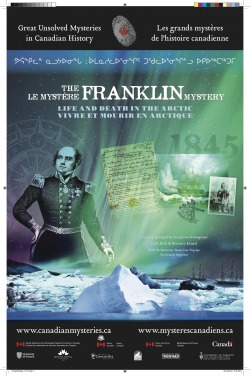Historian Ruth Sandwell to give three Talks in St. John's!

Dr. Ruth Sandwell, University of Toronto, will be in St. John's May 25-27. Her visit is funded by the Vice-President’s Scholarship in the Arts Program, and the talk at the Lantern is also sponsored by Democracy Alert. All are welcome to attend her presentations: details are provided below. For further information please refer to Dr Valerie Burton vburton@mun.ca.
Details on the presentations are as follows:
Monday, May 25 5- 6 p.m. The Lantern, Barnes Road (Parking in the Basilica car park)
Reluctant Voters: Youth Political Participation and Education for the 21st Century
Tuesday May 26 10.30 - 11.45 a.m. in Education 3048
History is a Verb: Teaching History by Doing History with The Franklin Mystery: Life and Death in the Arctic
Wednesday, May 27 1-2 p.m. in Arts 1043
Coaches in the Kitchen: Re-educating Canadian Women for the Modern Energy Regime, 1890-1960
For details please see the following abstracts and biography:
Reluctant Voters: Youth Political Participation and Education for the 21st Century
Young people in Newfoundland and Labrador are reluctant voters. At the federal general election of 2011 fewer than one in three 18 to 24 year olds cast a ballot. This was the lowest rate of voting in this age group in all ten provinces. Democracy Alert is a local group intent on reinvigorating education for political participation amongst school-age children and undergraduates.
History is a Verb: Teaching History by Doing History with The Franklin Mystery: Life and Death in the Arctic
Dr Sandwell will start this workshop with a brief overview of the recent research and trends in history teaching and learning that emphasize doing history, more particularly, how doing history is the best way of learning the six key historical thinking concepts that are now being included as explicit requirements in secondary school history and social studies curricula across Canada. She will then explain how the active history approach (engaging students in doing history) has been the rationale or big idea behind the Great Unsolved Mysteries in Canadian History project http://www.canadianmysteries.ca since 1997. The most recent of its mysteries is the Franklin project. It will be formally launched in Ottawa on June 4, but in this preview her audience will be able to examine some of the documents reproduced on the site. Particular attention will be given to one of the lesson plan exercises that focuses on the Inuit oral histories about Franklin that were gathered in the 1860s and '70s.
Coaches in the Kitchen: Re-educating Canadian Women for the Modern Energy Regime, 1890-1960
Energy is in the news these days, reflecting concerns about energy security, fossil fuel stocks, and climate change. We are reminded us on a daily basis of the deep connections that exist between our everyday lives – particularly the energy systems that provide us with heat, light, power, water, waste disposal, and food – and the larger social and material environments within which we live. This talk is part of a larger research project that examines the profound changes that accompanied Canadian households’ shift in energy use from wood and kerosene to coal, oil, gas and electricity, and explores the ways in which these energy-related changes worked themselves out in the broad economic and social transformations associated with modernity.
The talk focuses in on the remarkable public (re)education campaign that accompanied the shift to centralized and standardized systems of household power, particularly gas lighting and electricity, in Canada between 1890 and 1940. Governments (particularly through home economics programs) and both appliance and utility companies (though an astonishing variety of advertising and edu-tainment initiatives) became deeply involved in educating and re-educating an often-sceptical, largely-female public about the new fuels, manufacturing consumers as they manufactured fossil fuels and electricity. In the late nineteenth and early twentieth centuries, these initiatives dovetailed nicely with a wide range of women’s reform initiatives directed at improving their lives by decreasing their drudgery in the home, and making them more active citizens. This presentation will argue that this massive, varied and multi-faceted re-education project – providing “coaches in the kitchen” – had only limited success for the first two generations of women exposed to it; for a variety of reasons the majority of women remained largely sceptical of the claims being made for the new energy forms, and continued to rely instead on time-tested energy strategies until the post World War II period.
Dr. Ruth Sandwell
Dr. Sandwell's teaching and research interests are in Canadian history (of education, rural society and the family) and the teaching of history, and broadly reflect the importance of studies in the humanities in general, and history in particular, to theories and practices of education.
Her attention to developing discipline-based historical thinking in students and student teachers has brought Dr Sandwell recognition as a national leader in History education. She has a keen interest in innovative uses of primary documents that is best reflected in her role as a principal researcher with the award-winning “Great Unsolved Mysteries in Canadian History” project. In her publications she has treated changes in the meaning and purposes of history education, making particular reference to the relationship between family, the educational state, and the Canadian economy in nineteenth and twentieth century. Most recently she has turned to the social history of fossil fuels: exploring the massive public education campaign and changes in household behaviour that accompanied Canadians’ change from self-supporting energy systems in their homes (mainly wood) to the collectivities and mass consumption of energy from the grid.
http://www.oise.utoronto.ca/ctl/Faculty_Staff/Faculty_Profiles/738/Ruth_Sandwell.html